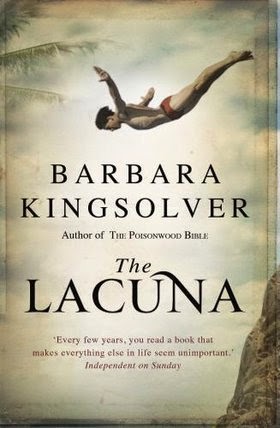#11 The Lacuna by Barbara Kingsolver


A reader recently compared my writing in Gatekeeper to Kingsolver’s. My agent was thrilled (what agent wouldn’t be?) while I am less convinced. I think it’s subject matter (Prodigal Summer) that prompted that linkage, rather than anything else. What strikes me most about Kingsolver’s work is the warmth – many characters start out less than appealing and win us over through their humanity; foibles and frailties becoming intrinsically attractive as we invest in them through the hints and glimpses she gives, that add up to rounded individuals with multi-faceted lives.
So what she attempts in The Lacuna is almost a reversal of her highly successful and acclaimed writing style. She shows us Harrison Shepherd much more though the lacunae – the gaps – than in his own words and his own facets. In fact one of those is honoured only in the breach; whilst Shepherd is homosexual, we see nothing of his sex life and only a little of his (largely disappointed) romantic impulses.
Instead the novel casts light by its shadows – as one of Diego Rivera’s crew he watches the muralist create, as Frida Kahlo’s cook he watches her machinate, as Trotsky’s secretary he watches him die, as America’s interpreter of Mexico he watches McCarthyism destroy the international nation in favour of an Anti-Red witch-hunt.
What makes this book special? There’s a meta-level that is profoundly relevant. Whilst Shepherd is largely absent from the pages (the Mexican section is narrated by him, much else is reported by others) it’s very clear that this young man who is curious but non-judgemental, ill-educated but well informed, largely invisible but indispensable, represents not only himself but the choices we all get to make. He is one version of America’s history – the version that did not implode on the fear of Communism. For each of us, now, similar choices are possible – the threat of terrorism can send us scurrying or we can face the reality of a globalised world without demonising the parts we find frightening. Kingsolver is prescient about the role of press and propaganda – published in 2009, the rumour and misreporting, scares and terror tactics of so-called Islamic State look very much like some of the claims and counter-claims made for, by and about Communism from the 1920s to the 1950s.
Below the meta-level Shepherd is a charming, shy and self-effacing character, but not a weak one. He is reserved rather than cowardly, he thinks for himself and learns from others, his loyalties are earned, his requirements few, his sufferings many. Through him we see much of history differently – Frido Kahlo, in particular is a masterpiece in miniature (pun intended), springing alive from the page in a manner as vivid as any of her paintings and as fully rounded as a bowling ball spinning along a dining table, sending the place settings and wine glasses flying. A devastating, unpredictable and somewhat ferocious human (and artist), she’s rendered so brilliantly by Kingsolver that I doubt a single reader won’t go to investigate her work again. I certainly did.
It’s a big book, treating of big themes. Having taken my (paperback) copy away with me, I can report it’s .48 of a kilo in weight and a three day read for somebody who’s usually a book-a-day reader (and one of my three days was a flight day with three hours of check-in and three flight hours!) and I’m happy with the investment I made; it’s a book, like all of Kingsolver’s, that will resonate for long after the reading. Highly recommended for those who are currently enjoying historical fiction, similar in scope and complexity to Mantel’s Wolf Hall, and vividly creating a landscape of a period that is almost contemporary but looks oddly distant.
A final note; my copy has the cover shown – it’s as profoundly factless as many of the news reports (some of them genuine artefacts) that are contained in the book. I’m not sure if this is deliberately provocative marketing or the all too common failure of a marketing department to engage with a book’s contents but there is no cliff diving in this novel that I can recall …


2 Comments
Jim Murdoch
9th February 2015I’ve only read one book by Kingsolver, The Bean Trees from 1988 and I wasn’t terribly impressed by her. Clearly she’s older and wiser here but if it takes you three days to get through a 500-page novel it’d probably take me a week and the older I get the more precious the weeks get; I don’t give them up too easily. It’s a moot point. At the moment I’m editing a, for me, huge novel (it’ll probably come in at 360 pages) and so I’m severely cutting back on both reading and blogging until I’m done. As I take my time over these things we’re talking weeks, not days. I’ve still committed to do some reviewing but it’ll be a while before I can look at your new book. Just so you know. Carrie’s got it at the moment.
Kay Sexton
30th May 2015Hi Jim, I am inclined to concur!
I’ve started reading skinnier and skinnier books as my life gets more complicated. As for blogging, I appear to have given it up almost entirely. Do let me know when your editing is done though, I always have time for something of yours.